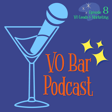The Musicality of Voiceover
00:00:00
Speaker
If it's a kid's show, maybe that works. If it's an ad for hemorrhoid cream, maybe it would still work, I guess. I don't know. Are you saying there's a time and a place? For analgesics, yes. And we're back, ladies and gentlemen. Oh my goodness. Analgesics, got it. Now I know why it didn't work.
00:00:34
Speaker
This is podcast gone bad. Oh, there's always one in a group. There's always one. In this group, there's three. That's why it's a group. Or a trio. If we were crows, we'd be a murder. The musicality
Avoiding a Sing-Songy Tone in Commercials
00:00:49
Speaker
of voiceover. Yay! La, la, la, la. Should we say that in harmony? Well, it may be discordant. Pick a note. Pick a note any note. Any note.
00:01:04
Speaker
We're professional folks, professionals. Okay, so musicality, a voiceover. Does that mean I'm sing-songy? No, God no. Hello and welcome to the show. Oh God, please don't. If you do that, then yes. I mean, that is sing-songy. Yeah, that's beautiful. Hopefully you're not booking with that. I guess it depends what it is, right? If it's a kid's show, then maybe that works.
00:01:35
Speaker
If it's an ad for hemorrhoid cream. Are you saying there's a time and a place? For analgesics, yes. And we're back, ladies and gentlemen. Oh my goodness. Analgesics, got it. Now I know why it didn't work.
The Role of Breathing Techniques in Voiceover
00:02:08
Speaker
is podcast gone bad. Then there was 23 minutes of them laughing at us. It was the dumbest podcast ever, but I couldn't turn it off. I am wiping tears of joy from my face. Success. Yay. Okay.
00:02:31
Speaker
So, musicality. Yeah. Tell me about it. Tell you about what you tell me about it. You're the musician. We have a lot in common. We've discussed this. There's breathing, being a singer, you're walking, you're running, you're jumping, you're waving your arms in the air, and you're still singing. So, there is body control that comes into play. If you're doing animation,
00:03:00
Speaker
You've got to be able to take those moments and you've got to be able to put words to them. You've got to do the motions. Or at least sound like you're doing the motions. Yeah. Because it's tough to run a marathon, but stay on mic. It really is. Let's be honest, it's tough to run a marathon. Full stop. And done. Thanks for joining us, folks.
Musicianship and Breath Control in Voiceover
00:03:23
Speaker
And we'll be back next week. You're saying I have to breathe?
00:03:29
Speaker
What is this breathing thing? But do you think that's why a lot of folks that have been musicians, okay, that's a totally different type of podcast now. So there's a lot of folks who are professional singers as well as musicians that find themselves in voiceover and I think they have an advantage.
00:03:53
Speaker
Right? Yeah. Oh, for sure. Yeah. Because better breath control, larger volume of breath. Yep. Yes. Right. Can talk for longer without having to take a breath. Right. Or they take a really subtle breath that cannot really, it's not very audible. Right. So. And then there's the cyclical breathing, right? That's a thing, right? It's been many, many years since I played the trombone, but I remember that being a thing.
00:04:21
Speaker
That's like the Kenny G note. You guys don't know about the Kenny G note? Didn't you hear the crickets? Cyclical breathing. That's what he does. That's what he does where he almost fell out of my chair. I couldn't believe it. He plays this note where it's he's breathing in and out as one does while he's playing his instrument.
00:04:47
Speaker
interesting yeah it's uh it's it's like whistling while breathing in i can see i can i can do that i don't know how you would play a saxophone like i i don't know either that's why it's his job um but yeah it's kenny g's note yeah he that's why he plays his note he can play his notes so
00:05:05
Speaker
Easy you. That's how he plays his notes so long. There's a joke here. I'm just going to let it. There's a couple of jokes in there. But yes, he can be because he breathes in and he breathes out to extend the length of his notes. Wow. Of his notes. We're talking about notes, people. We are. We are. And breath control. Yes. Yeah. That didn't sound like a lot of support behind that breath.
00:05:35
Speaker
Well, I find a lot of scripts are not written very well in terms of...
Challenges with Voiceover Scripts
00:05:44
Speaker
To be read. To be read out loud. Clearly, there are some writers who have created the copy and tried to read it out loud, and they might break up some really long sentences. Shoot, what are they called? Run-ons, right? You think people are actually reading the things out loud. I don't...
00:06:04
Speaker
I think it's the norm. I think some do. But I do think that's our job as voice actors to kind of break up that script if we need to, because it's really difficult. Yeah, that's why the punctuation is sometimes just the suggestion. Yes. You know, I find helps a lot with dense text is dropping it into a text editor and editing the layout of it first so that I can break it up
00:06:34
Speaker
into the groupings and the phrasings and stuff that just makes sense for how I'm going to say it. Visually. Versus just, here's one big block of text and I need to read through this thing and sound real and conversational and like, I know what the hell I'm talking about, but I can barely read it because it's just a big block of text and my eyes go, that's musicality. You break it up into verse, chorus, verse. Hey, see? Okay. There it is. Ta-da.
00:07:03
Speaker
There it is. So there's a little tip for you. If you get a block of text that's difficult to wrap your head around, reformat it on the page. Do either of you have any, do you do anything before you start recording as far as any breath control exercise?
Musical Backgrounds and Their Influence on Voiceover
00:07:19
Speaker
That's my business. Yeah, I'm talking, okay. Let me explain.
00:07:24
Speaker
for myself. Voiceover related. Anything voiceover related? Voiceover related before you. You mean like warmups? Warmups, yes, vocal warmups. I usually don't. No? I know I should, but I don't. I sing. I don't do enough. Oftentimes I don't even fully break down a script before I record my first pass. I oftentimes will just do a cold read first. Okay. And then kind of find my way through it and figure out, you know, kind of
00:07:52
Speaker
okay here's where it's going and here's where I'm coming from and here's the you know and then I'll once I've discovered it I'll record it but and disk space is cheap I've got a ton of space sure cost me nothing to just record it so usually doesn't happen but you never know that first cold read you might sometimes it's a keeper really nail it or or get something you know that that gets you close that you can listen back going yeah that's good just a little bit mm-hmm
00:08:20
Speaker
How many times do you normally go over a script when you record? It depends on the script. There have been times where I'm just not getting it and instead of standing up and walking away like I should, because it's due in the morning and it's 2 a.m. and I need to get it done, that I'll do like 10 or 15 or whatever takes and finally I'm just like this one.
00:08:47
Speaker
The only time I've ever done that many takes is when they're looking for three to five. Yeah, yeah. If they're only looking for one, I'm not doing 15. OK, thank you. I'm like, well, we need to talk. Because that's too much. Ideally, I would like to spend five minutes or less recording. Yeah. But I'm not setting a hard time limit because I'm not. I don't feel like I have any specific time constraints. I'm not doing pay to play. Right. Right. So, you know, turning it in in five seconds is not a priority for me.
00:09:17
Speaker
All the additions that I'm doing lately are through representation and they have a due date and turning it in early isn't generally helpful with the representation I have because they batch it to casting anyway. They collect everything and send one batch. There's one who I think maybe does it different sometimes.
00:09:38
Speaker
But the other two are collecting everything and sending them as one big batch. So as long as I get it done before they say they need it, then it's done. Perfect. Right. That's always nice. Yeah. I mean, that was one of the things that I really didn't like. There are many things I didn't like about pay to play. And, you know, by not being on there, I book less right now because I'm still working on my marketing game and so forth. But I also have a horrible algorithm. Horrible.
00:10:08
Speaker
But I also have a pretty well-paid day job, so I'm not starving for work either. So I'm able to say, you know what, I didn't feel I was getting anything out of being on the pay-to-plays other than frustration. So I'm not going to give them my money anymore. And if that means that I book less for now, so be it. But it also means you're getting quality auditions. I am. And I book less, but the things that I book are much more worthwhile.
00:10:34
Speaker
Boy, that's a nice, that's a nice exchange. I can't even say that as a blanket statement though, because I did book my first seg gig on a pay to play. It wasn't listed as being a seg gig. They told me that after the fact. They're like, so this is a union job, so is that okay? I'm like, yeah.
00:10:53
Speaker
That was two years ago and Last last year in March and this year this month. I got a renewal check. That's a great gig Presumably that'll keep going for a few more years. I would think right, you know I suspect that the longevity on that's at least five years. So it could be ten who knows that'll make you sing a song and
00:11:15
Speaker
That's musical. So in that sense, you know, everything that I spent on that pay to play is more than covered from the one job. But they majorly screwed me last time that I used them. And so I'm I'm well shot of pay to place. Yeah. Anyway, that's kind of a little bit off topic. What's your musical history, Victoria? Oh, well, I I did learn how to play
00:11:43
Speaker
Don't say spoons. The Mandalorian. I mean, the Mandolin. The Mandalorian, yes. Let's go back to Star Wars. Now, I learned how I took trumpet. I learned how to play the piano. And you guys are going to laugh because I'm always laughed at when I said that too. And I also learned how to play the organ.
00:12:02
Speaker
I also took singing lessons and did a lot of
Preferences for Musicals and Voiceover Training
00:12:06
Speaker
solos. So I used to be a soloist and I did some training for that with pop vocals and stuff in New York.
00:12:16
Speaker
Because, and this sounds really awful, but I enjoy being a part of a musical. I don't like watching musicals. There's three musicals I will watch. I just, I can't do musical theater. And that's horrible because I have some wonderful friends. Like that is their universe. They love it. And I just, I can't. I get three. That's it. So, but as far as, you know,
00:12:41
Speaker
I think it helps for me because I do sing a little bit before I will go in and start doing my auditioning. Or before session. So you warm up singing? I do vocal warmups. I do. And I mean, I think it helps because I have a naturally gravelly voice anyway. As I'm getting older, it's really starting to be a little bit more pronounced.
00:13:07
Speaker
But the singing helps a little bit. And now I'm in my head. Did I say singing properly? Singing. Singing. Singing. I was corrected about my ING words earlier. Did I say that right? Singing. Yes.
Posture and Breath Control Techniques
00:13:26
Speaker
That's right. Yes. So anyway, that helps.
00:13:31
Speaker
I could still get better on breath work, but I think sitting down is a disadvantage for me. So I have a, and I think standing up when I'm in session, I always take my chair out of my booth. I'm always standing for actual booked work. And if it's really, really important and for certain genres, I'm only standing.
00:13:55
Speaker
But I will notice a distinct difference when I audition when I'm standing. And I think it has to do with, even when you're singing, you have to breathe differently. And I think when I'm seated, I have a tendency to slouch. So the posture part of it really plays a big difference in your overall delivery. Sure. Well, it constricts you. Yeah, exactly. Sure.
00:14:22
Speaker
I've heard from a musical end, some people, they have specific music they play to get them mentally in a mood. I've heard that. I usually just curl up and cry on the floor. I was thinking a little Barry White, perhaps? Maybe. But yeah, I've heard people do that. When they start recording, it's all
00:14:50
Speaker
in their head. So they have to get, they play music for the specific role. Whether it's a concerto or it's heavy metal. And that puts them in that headspace. I have, not often, but a couple times played music well I recorded.
00:15:13
Speaker
Do you guys listen to if they give you a scratch track or sometimes they'll give you the music? I love when that happens. Don't you? It's so good. It's really nice. In those cases, I definitely listen to the music while I record.
Music's Influence on Voiceover Performance
00:15:27
Speaker
But there are times where I'm not in the right headspace for auditions that day, but the show must go on. So I'll listen to something that is...
00:15:42
Speaker
kind of the right mood while I record. So it's playing in my headphones while I'm recording. It doesn't pick up on the mic, but it helps me convey the right mood. But it can also help sort of, I don't know, it can help with the phrasing and the cadence and stuff, right? Because you can kind of almost find yourself going to the beat of the song.
00:16:05
Speaker
Right. And so then that musicality translates into the text that maybe wouldn't be there otherwise. Whether it works or not, I don't know. I probably booked one or two that way.
00:16:20
Speaker
I think it's important to point out, just like you were talking about. I don't think we were recording at the time, but we're saying how the musicality of it is not sing-song. I don't remember if we said that or not, because it's distinctly not what we're talking about.
00:16:37
Speaker
Yeah, because there are definitely people who that's their default go-to, which is wrong. That, you know, commercials should be sort of this up and down and talking about things like this. And I've got a very musical sound to my voice and is whatever and it's terrible. Right. And that's not going to book. Please read of children's books. Hopefully, coaches will beat that out of you.
Musicality in Monotone Readings
00:17:00
Speaker
Yeah. But even a monotone reed has musicality in it, right? Because music is more than just the pitch. It's also the speed and the rests and the tempo, the cadence. Yeah. Agreed. So everything, every bit of it has music.
00:17:18
Speaker
in it. Sure. And if you get down to it, you know, music is really just math. So don't ruin it for me. Absolutely. You got to do math every day. No, not all the time. Always. You don't do the math? Nope. No doing of the maths. Then how are you booking all the time? Because I don't do math. No, no, thank you. So it's not the word on the street.
00:17:47
Speaker
Indeed. Word on the street is you do all the math. That's math, not math. I was referring to the way they call it, you know, mathematics and they call it maths in England. I do like it. I do like that. It is very posh. Very posh. Maths. Maths. Yeah, because it is mathematics. It is. Yeah, it's more than one kind of math. Yeah, but we can't math.
00:18:17
Speaker
Math. No wonder we don't like it. Right? See? Because it's a singular ew. A singular ew. Instead of many ews. Like so many ews. Yuck. That sounds like ews. Yeah, that's what she said. So yeah, I think, you know, musically inclined people are just sort of inherently have a little bit of an advantage when it comes to voiceover because
00:18:45
Speaker
Once you've done musical performance of any sort, you can't help but fall into the rhythms and the whatever. Sure. Yeah. But you still have to study, you still have to coach, you still, you can't do everything using that inside rhythm. I mean, there's, yeah. It helps.
00:19:05
Speaker
It is your instrument, your vocal instrument. So I mean, there's been a lot of things where they say it is just like playing an instrument. But I'm sure there's plenty of people that have never touched any.
00:19:21
Speaker
musical instrument going, well, great, now I got nothing. So we're not saying that you have to have that as a background. It's just helpful. And you don't have to have played an instrument. I mean, everybody has sung along to a song on the radio. So you understand. Bad or good. Yeah. Even if you sound terrible, you understand the structure of your favorite song. Even if you don't comprehend it, you understand it.
00:19:48
Speaker
understand the difference between a verse and a chorus and whatever. And again, even if you don't know the terminology and you don't really understand it, you just innately know it. Sure. And so, you know, those of us who have played instruments or done more musical musical production or played the organ or played the organ. Yeah, we maybe have a little bit of a leg up over those who don't. But that doesn't mean that you're not going to be able to do it.
00:20:18
Speaker
Right. It's just an advantage. It's a tool in the toolbox. Oh, the tools in the toolbox. There's lots of tools learned. Don't be one. Love it. And that's all I have for today. Don't be a tool. That's all you got. Don't be a tool in the toolbox. Don't be a tool in the toolbox. Use your tools in the toolbox. Yes. Correct. Well, be careful how you use that sentence as well.
00:20:48
Speaker
That's what she said. It is. Just now she said it. I really did. I just said it. Keep your tool in your own box. Oof. Aye, aye, aye. OK. If you've got musical skills, use them. If you don't have musical skills, use them. Use them. Find some. Look for a toolbox and find them.
00:21:19
Speaker
Yeah. I got nothing. All right. The musicality of voiceover. Play music in your headphones. That's yours. Well, I like that. Yeah. Give it a try. It's kind of fun. Just don't play it so loud that the mic picks it up. Oh, there's that. Right, right, right. Yeah. Plus then you'll end up shouting the whole time. So I went down to the start! Wait, what? Huh? Why are my levels all off?
00:21:45
Speaker
What happened? It just doesn't sound right. It sounds so loud. Ew. I can't hit the right emotion. Do you ever slip into the lyrics of the song you're hearing? I haven't listened to music with lyrics when I've done it. It's just been instrumental. Otherwise, I think I would distract myself. Yeah. Because if I'm hearing some other words, it'd be like recording while you're hearing yourself with a delay. Oh, I can't do that. Which is the worst.
00:22:14
Speaker
The worst. Yeah, because you got different feedback coming to your brain than what should be and no. That's like the worst Source Connect session ever. Yeah. It's like singing the national anthem at a ballpark and hearing your voice come back at you. But worse because you're wearing headphones. Yes. Yeah.
00:22:42
Speaker
Well, thanks for joining us. I'm going to go get another beverage. Great idea. Good night, everybody.

















